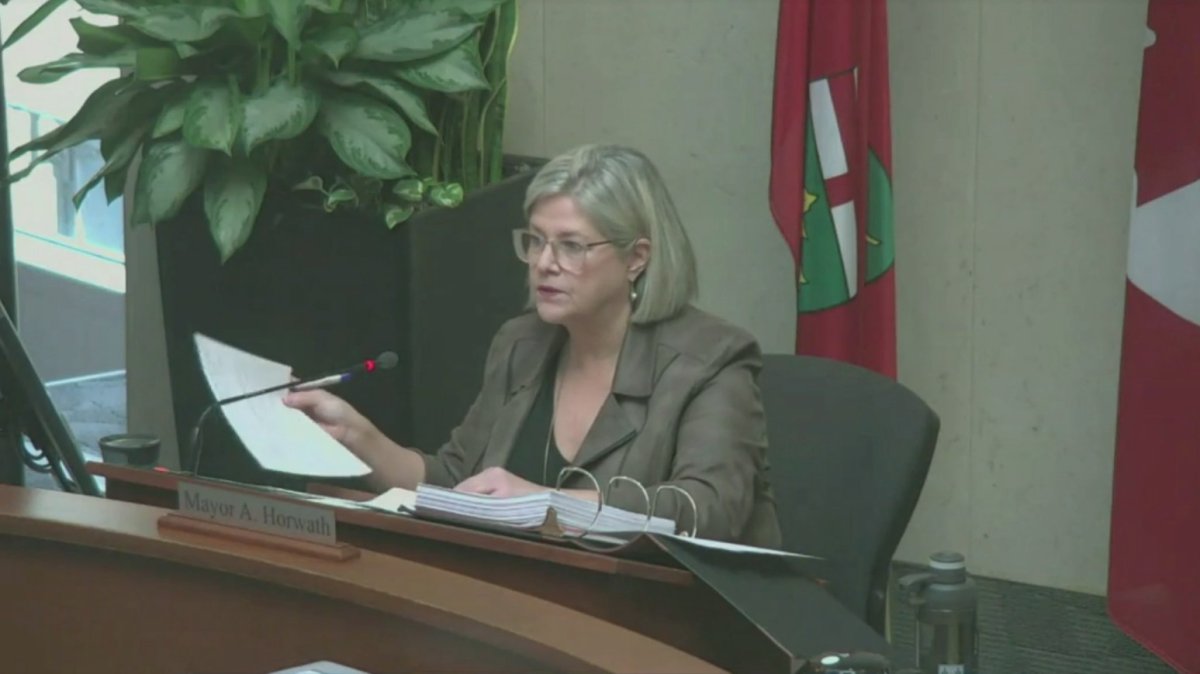Hamilton’s mayor says she’s in favour of a call to change the makeup of the city’s board of health to include health experts and more diversity.

Andrea Horwath believes a recent “detailed” motion to effect changes in a board comprised of 16 council members didn’t pass because not all stakeholders are at the “same spot” in understanding the model and its potential benefits.
“We haven’t really had a chance to dig into it as a brand new council with two-thirds new people around the table,” Horwath told 900 CHML’s Good Morning Hamilton.
“I think the reason that it failed was because people just felt — and this is certainly my feeling as the mayor — we need to give the councillors the respect and the time.”
The idea of restructuring was first brought before city hall in March 2021, with health experts and representatives of racialized communities issuing the call during a series of presentations.
Some delegates, including Hamilton Anti-Racism Resource Centre director Lyndon George, suggested a model resembling boards in Toronto and Ottawa, where community voices are represented at the table.

Get weekly health news
New voices on the board theoretically could close a gap between well-off neighbourhoods and poorer locations in the city.
“It is something that has worked,” George said last March. “They have been able to bring in health experts, lived experience and been able to shape public discourse.”
In January, the board revealed that those living in the city’s poor neighbourhoods – based on family and individual median incomes in Hamilton – are three times more likely to die from a preventable or treatable cause.
Horwath added that the COVID-19 pandemic was the catalyst to bring the problem into a brighter light via large case numbers and negative results in several of the city’s lower-income neighbourhoods.
“As a public health board, we’re determining policies and programs and how we rule things out,” she said.
“Having those diverse voices at the table will really make sure … we have more of an equity lens to do the work that we do.”
Alterations would also allow non-budget and non-personnel decisions made by the board to pass without city council approval.
However, amendments would require changes to the City of Hamilton Act and the Health Protection and Promotion Act, likely needing some participation from the province.
At Wednesday’s council meeting, Ward 8 Coun. John-Paul Danko read a response from Ontario’s medical officer Dr. Kieron Moore clarifying the city’s options.
The first was a “semi-autonomous” option, like Toronto and Ottawa, requiring changes to both acts.
The other was an ad hoc advisory committee, which could include community representation.
Ward 2’s Cameron Kroetsch introduced a motion at Wednesday’s council meeting to push ahead with the adjustments and a board composed of six councillors, six community health professionals and an education representative.
Support came from Ward 9 Coun. Brad Clark, who suggested the city may have the power to make the changes.
That was eventually withdrawn due to dissent from some councillors not seeing the urgency for the adjustments.
“I just fundamentally and theoretically am opposed to taking away any of the 16 members of council who serve on board of health … because we were elected by the community,” Ward 6 Coun. Tom Jackson said.
“I just would feel it as a form of abdicating my responsibility.”
Jackson also suggested the exercise could be “moot” with Ontario’s proposed consolidation of the province’s 35 public health units into 10 regional agencies.
For the time being, councillors have approved a motion from Danko seeking a staff report on options to bring on a semi-autonomous board.
Horwath says that study will come back “this fall after the summer, but before the end of the year” for a Q3 sub-committee review.














Comments